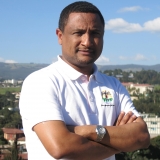As a result of growing demand for electricity and recognizing the critical role played by the energy sector in the economic growth and development process, the Government of Ethiopia has already embarked on large scale hydroelectricity projects in view of developing renewable and sustainable energy sources. The goal of this project is to contribute to the fulfillment of these efforts in expanding modern energy access and reducing energy poverty through accelerating the growth of the economy.
Ethiopia has a tremendous potential for producing and generating electricity. The country’s hydropower potential of 45,000 megawatts is the second largest next to the Democratic Republic of Congo in Africa. Ethiopia has also a considerable energy potential from other renewable energy resources including solar, wind, geothermal, and natural gas. However, the country has one of the world’s lowest rates of access to modern energy services, and relies primarily on traditional biomass to fulfill its energy needs.
As a result of growing demand for electricity and recognizing the critical role played by the energy sector in the economic growth and development process, the Government of Ethiopia has already embarked on large scale hydroelectricity projects in view of developing renewable and sustainable energy sources. However, funding these large scale hydroelectricity projects requires sufficient resources which may necessitate the government to revise the electricity prices. Electricity pricing shocks may have a series impact on the demand for electricity both at household and firm levels and the welfare of the society in general. It is, however, surprising the there are limited studies that can be used for policy purpose, as revealed by a limited literature. Hence, it is necessary to understand the micro-macro determinants of the demand for electricity in Ethiopia. At micro level, it is possible to identify and understand the role of price and income on the consumption of electricity byhouseholds and firms. At macro level, it is timely to inform planners about the link between economic growth and energy consumption.While both micro- and macro-econometric models are relevant to identify specific variables affecting the demand for electricity, the link between the electricity sector and the rest of the economy can be understood using computable general equilibrium (CGE) models.
Specifically, the study aims to (i) identify the micro and macro level determinants of the demand for electricity in Ethiopia.(ii)analyse the impact of electricity pricing shock on the Ethiopian economy using a Computable General Equilibrium Model.The data from the Ethiopian Central Statistical Agency (CSA) and the Social Accounting Matrix (SAM) constructed by the Ethiopian Development Research Institute (EDRI) will be used for the empirical analysis.Analytical approaches integrating micro and macroeconomic models will be employed in order to get advantages of each methodology.
The outcomes of this project are relevant in terms of sharpening the policy, enhancing the wide use of electricity, facilitating in the selection of policy instruments in the context of a medium-to long-term development strategy with a focus on poverty reduction and environmental sustainability.This study will also give insights on the economy-wide effects of electricity tariff change in Ethiopia and how policy makers or energy planners will manage the sector and avoid unnecessary investments by utilizing the available plants more efficiently.

